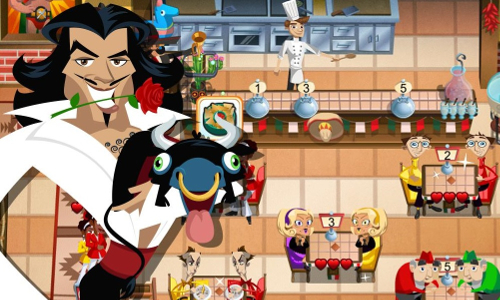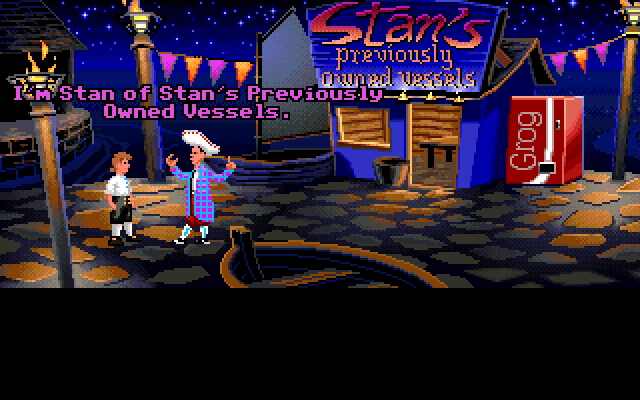This article was originally published as a guest post on Marianna’s blog (1Up translations) and is the French counterpart to her article about German translation, that was also published here “Accents and Dialects in Games—Yay or Nay?”.
In video games, we get to meet characters who are larger than life, caricatures of real people. They dress in a very specific way, have their own strong personality and are sometimes further differentiated by having a nationality, an ethnicity, real or not, which can be associated with a corresponding accent. The purpose of all these characteristics is to make the characters unique. In turn, this helps with the immersion of the player in the fictional world. In the beautiful world of games, you get to meet Scottish dwarves, Russian vampires, French elves, and the odd Italian plumber too.
The tricks used to translate and transcribe these accents in French depend on the tone, the genre and the target audience of the game. Take a cartoonish game for example, in which you manage a restaurant and serve customers as fast as possible. A whole array of cooks is here to help you: an Italian pizzaiolo with a big moustache, a Chinese cook with a Mao suit and don’t even ask about the Spanish cook.

So, where is this guy from?
In this type of games, the appearance of the characters is exaggerated. The French carry a baguette or an accordion and the Germans a beer or a pretzel, or both. In this example, it is acceptable to use clichés in the speech too and to exaggerate the traits of the characters by having them used phrases like “omelette du fromage” which, by the way, makes no sense in French.
On the other hand, in fantasy MMORPGs, which are more serious and literary than the casual mobile game mentioned above, the accents serve a slightly different purpose: they give flavour to entire people and races, not to a single character at a time. Severe clichés have to be avoided and the differentiation must be done more gracefully. The goal is to give a feeling of reality, even though there are things like magic and trolls, and nobody ever has to pee. In Runescape, for instance, everybody speaks with a different accent depending on which part of the huge map they live in. Generally, more boorish races like dwarves and orcs speak with a Northern accent, be it North of England (Scottish, Scouse) or North of Europe (Scandinavian), while the elves tend to speak British English peppered with obscure and complicated words. Then there are the people who live “far away”, usually in a sunny desert of some sort. They tend to have a northern African or Spanish accent. In French, we usually replace these accents by a difference in the level of language: elves in their speech are posh, pretentious, highly literate and use obscure words. On the other side of the spectrum, dwarves are uneducated, take things literally, have a limited vocabulary, and possibly even make grammar mistakes.
The game translator must ask him/herself the right questions when encountering accents in the source text: What does the character look like? Is he/she obviously from a specific country? Would the accent used work in French and how to transcribe it with French words in the subtitles? Or maybe this accent would be offensive to a French audience? Or is not translatable at all? What can I use instead? What is the purpose of the accent in the source text – humour, realism, character definition? Did the client give any directions? The rule of thumb is this: if the client didn’t use an accent, don’t add one. There are a few exceptions, though. For example, when the character has a linguistic quirk that can’t be translated into French, we sometimes add an accent. For example, we can make a pirate Spanish if he uses pirate talk in English, since we don’t have any equivalent, or we can change the nationality of a Londoner who used Cockney Rhyming slang, which is not translatable. Of course, the client must be consulted first.

Clichés have existed in game since the very beginning
As I work from English to French and the two languages are culturally and geographically close, I can usually keep in my translations the accents used in the English source, when these accents are foreign – German, Chinese, Russian, Spanish, etc. To transcribe accents for the subtitles, the translator can use a few different tricks. The first one is altering the spelling: this can be adding the Spanish punctuation marks ¿ ¡, crossing the ø for Danish or Norwegian, or changing the u by и to make the text look Russian, even though и is actually the ‘i’ sound. Then, the translator can pepper the speech with foreign words that are more or less widely known in France – even if they would be grammatically incorrect in the native language. An easy one is yes: da, sí, ja, it instantly gives flavour. Then there are the hundreds of words that were borrowed from other languages and can usually be successfully included in the translation. For the translation of spoken dialogs, the voice actors are supplied with a script in standard French, along with tips on which accents and intonations to use. It’s important not to overdo the accents. Few things would be more annoying (and offensive) than a Spaniard who keeps saying “Olé” every other line. A few critics complained for example that in Pokémon Sun the NPCs inspired by Hawaiians keep saying “Alola” all the time (not Aloha, they are not real Hawaiians, Alola is the name of their country), until you just want to slap them. Accents are kept or even introduced in certain types of games for comic relief, but usually, the common practice is homogenization. Moreover, overusing spoken or written accents can also make the dialogues very hard to understand by the player. If the original message gets lost, then the translation is a failure.
Translating the different variants of the English language – American, Irish, Welsh, etc. is trickier as they are sometimes associated with a very small area or even a single city. These variants can usually be either removed or replaced by the French variants from different regions or, more accurately, stereotypical words and phrases from these regions: “Bourgmestre”, “Septante” for Belgium, “Tabernacle”, “Magasiner” for Québec, “Hein”, “Quinquin” for Northern France, “Emboucaner”, “Cagade” for Marseilles, and so on. When there are many different people and not enough available accents, it’s time to resort to specific quirks such as a lisp (Sssoyez asssuré de ma loyauté, mon Ssseigneur), hesitation (Euh, oui, hum, c’est-à-dire…) or overusing a given semantic field with tons of metaphors and images.
In the English version of games, it happens that a French accent is used. What should the French translator do then? It depends once more on the character design. If the character is obviously French, which is cunningly implied because he is wearing a beret, a striped sweater, red wine, a baguette or all these items combined, then we can’t change the accent, as we obviously can’t pretend that the character isn’t French. A regional tone works in some cases, for example from Brittany, to play along with the striped sweater, but the safest course of action is usually to use standard French.
A not so distorted view of the French accent (Deux Ex)
If the character is French only for comic purposes or to give an extra layer of complexity, then his nationality can be changed. For some reason, in cartoons, the French become Italian, like the skunk Pépé Le Pew and the cook in the Little Mermaid. We do share the same flirty and foodie clichés after all. For French characters that are less grotesque, is it really necessary to keep an accent? Usually not. They can talk in regular French.
When dealing with accents and nationalities, is essential not to be mean or use condescending clichés. Because of France’s past, the stereotypical African accent must be avoided. It was widely used in the 20th century in French and Belgian comics, along with offensive character art – see the pirate lookout in Asterix. The accent, typically expressed by removing all the “r”, is as offensive as the graphics and should never be used in games. Clichés shouldn’t be expressed too heavily: the flirty Italian, the drunk Irish, the Indian yogi, the fat American, the Chinese Kung Fu expert. It is always better to tone it down than to overdo it.
It would be very interesting to find out what solutions are used when translating in a combination of languages that are more further apart than English and French: Russian and Chinese, Polish and Swahili, and so on. Drastic decisions must be taken by the localization teams when the culture is completely different in the source and in the target country. The most documented pair is Japanese to English, which produces as many expertly crafted exquisite translations as censorship claims, peppering Twitter every other week.
As we have seen, the difficulty when localizing games does not really reside in deciding which accent to use or how to transcribe a given accent, but rather in finding out with which intensity this must be done. Not enough hints, and the player won’t notice that the character originates from a given area or country. Not enough subtlety, and there’s a risk of offending someone, even though the limits are higher in video games than in real life. What level of political correctness should be used? This can be discussed with the client, but, as an expert in his/her native culture, including what is acceptable and what is prohibited or taboo, the translator should ultimately make the final decision in order to convey the feel of the game without causing offense, taking into account all the various aspects of the game.
 English
English French
French

One thought on “Translating Dialects and Accents in Video Games”
Comments are closed.